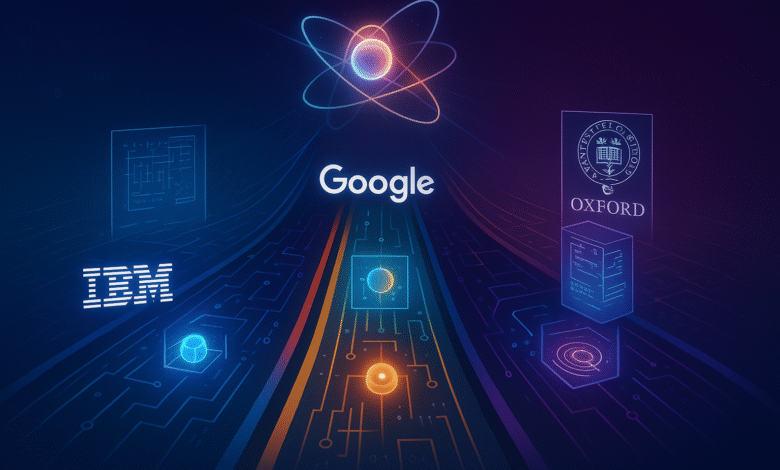Quantum Race: IBM vs Google vs Oxford Progress

The quantum race has become one of the most exciting technological competitions of our time. Three major players are leading this revolutionary charge: IBM, Google, and Oxford University. Each organization brings unique strengths to quantum computing development, creating a thrilling battle for quantum supremacy that could reshape our digital future.
Understanding the Quantum Computing Revolution
Quantum computing represents a fundamental shift from traditional computing. While classical computers use bits that exist as either 0 or 1, quantum computers use quantum bits (qubits) that can exist in multiple states simultaneously. This quantum advantage allows these machines to solve complex problems exponentially faster than conventional computers.
The quantum race isn’t just about building faster computers. It’s about creating machines that can revolutionize fields like drug discovery, financial modeling, artificial intelligence, and cryptography. The winner of this race could gain significant economic and strategic advantages across multiple industries.
IBM’s Quantum Leadership Strategy
IBM has positioned itself as a pioneer in the quantum race through its comprehensive quantum computing ecosystem. The company’s approach focuses on making quantum computing accessible to businesses and researchers worldwide.
IBM Quantum Network
IBM’s quantum network includes over 200 members from academic institutions, research labs, and Fortune 500 companies. This collaborative approach helps IBM stay ahead in the quantum race by leveraging diverse expertise and use cases.
The company operates more than 20 quantum computers accessible through the cloud, making it the largest fleet of quantum systems available to the public. This accessibility strategy gives IBM a significant advantage in the ongoing quantum race.
Hardware Innovations
IBM’s quantum processors have steadily improved in both qubit count and quality. Their latest systems feature advanced error correction and longer coherence times, crucial factors in the quantum race for practical quantum advantage.
The company’s roadmap includes plans for systems with thousands of qubits by 2030, demonstrating their commitment to winning the quantum race through scalable hardware development.
Software and Programming Tools
IBM has developed Qiskit, an open-source quantum computing framework that makes quantum programming more accessible. This software ecosystem strengthens IBM’s position in the quantum race by building a community of quantum developers.
The platform includes quantum simulators, optimization tools, and machine learning libraries specifically designed for quantum applications, giving IBM a comprehensive advantage in the quantum race.
Also Read: 7 Quantum Computing Apps Transforming Our Future
Google’s Quantum Supremacy Push
Google has taken a bold approach to the quantum race, focusing on achieving quantum supremacy and demonstrating clear quantum advantages over classical computers.
Breakthrough Achievements
In 2019, Google claimed to achieve quantum supremacy with their Sycamore processor, performing a calculation in 200 seconds that would take classical computers thousands of years. This milestone marked a significant moment in the quantum race.
However, the quantum race continues as competitors challenged Google’s claims and developed improved classical algorithms. This ongoing debate highlights the competitive nature of quantum computing development.
Technical Approach
Google’s quantum computers use superconducting qubits and focus on near-term algorithms that could provide practical advantages. Their approach to the quantum race emphasizes quality over quantity in qubit development.
The company’s research concentrates on quantum error correction, quantum machine learning, and quantum chemistry applications, positioning them strategically in the quantum race for commercial applications.
Research Partnerships
Google collaborates with leading universities and research institutions to accelerate their progress in the quantum race. These partnerships provide access to cutting-edge research and help validate their quantum computing breakthroughs.
The company’s quantum AI team works on developing quantum algorithms for machine learning, potentially giving Google a unique advantage in the quantum race by combining their AI expertise with quantum computing.
Oxford University’s Academic Excellence
Oxford University brings a different perspective to the quantum race through fundamental research and innovative quantum technologies that could revolutionize the field.
Trapped-Ion Technology
Oxford’s approach to the quantum race focuses on trapped-ion quantum computers, which offer exceptional qubit quality and long coherence times. This technology could provide advantages in specific applications within the quantum race.
Universal Quantum, a spinoff from Oxford, is commercializing this trapped-ion technology, bringing academic innovations into the competitive quantum race for practical quantum computing.
Quantum Networking Research
Oxford researchers are pioneering quantum networking technologies that could connect quantum computers across long distances. This research positions Oxford uniquely in the quantum race by focusing on quantum communication infrastructure.
The university’s work on quantum key distribution and quantum internet protocols could become crucial components as the quantum race evolves toward networked quantum systems.
Photonic Quantum Computing
Oxford’s research into photonic quantum computing offers another pathway in the quantum race. Photonic systems operate at room temperature and could provide advantages for specific quantum applications.
Companies like Xanadu and PsiQuantum are developing photonic quantum computers based on research principles established at institutions like Oxford, diversifying approaches in the quantum race.
Comparing Technologies and Approaches
The quantum race features different technological approaches, each with unique advantages and challenges that could determine the ultimate winner.
Qubit Technologies
IBM primarily uses superconducting qubits, Google focuses on superconducting systems optimized for specific algorithms, while Oxford explores trapped-ion and photonic approaches. Each technology brings different strengths to the quantum race.
Superconducting qubits offer fast gate operations but require extremely low temperatures. Trapped-ion systems provide high-fidelity operations but operate more slowly. Photonic systems work at room temperature but face different scalability challenges.
Scalability Strategies
The quantum race ultimately depends on building large-scale, error-corrected quantum computers. IBM’s modular approach focuses on connecting multiple quantum processors, while Google emphasizes improving individual processor capabilities.
Oxford’s academic research contributes fundamental insights into scalability challenges that all participants in the quantum race must address, including error correction, qubit connectivity, and system control.
Commercial Applications
Each player in the quantum race targets different commercial applications. IBM focuses on enterprise solutions across multiple industries, Google emphasizes machine learning and optimization, while Oxford’s research enables breakthrough applications in quantum sensing and communication.
Current Progress and Milestones
The quantum race has seen remarkable progress from all participants, with each achieving significant milestones that advance the entire field.
Performance Metrics
IBM has demonstrated quantum volume improvements and increased system availability. Google has shown quantum advantage in specific computational tasks. Oxford’s research has enabled new quantum technologies and startup companies.
These achievements in the quantum race demonstrate that quantum computing is transitioning from laboratory curiosity to practical technology with real-world applications.
Industry Impact
The quantum race is driving investment, talent acquisition, and research collaboration across the technology sector. Major corporations are partnering with quantum computing leaders to prepare for the quantum advantage.
Venture capital investment in quantum startups has increased dramatically, fueled by progress in the quantum race and growing commercial interest in quantum applications.
Challenges Facing All Competitors
Despite progress, the quantum race faces significant technical and practical challenges that all participants must overcome.
Error Correction
Quantum computers are extremely sensitive to environmental interference, making error correction crucial for practical applications. The quantum race ultimately depends on developing fault-tolerant quantum systems.
Current quantum computers are in the “noisy intermediate-scale quantum” (NISQ) era, where useful applications must work despite high error rates. The quantum race winner will likely be the first to achieve fault-tolerant quantum computing.
Scalability Issues
Building large-scale quantum computers requires solving complex engineering challenges in quantum control, connectivity, and error correction. The quantum race demands innovations in quantum system architecture and manufacturing.
Each approach in the quantum race faces different scalability challenges, and the ultimate winner may depend on which technology can most effectively overcome these limitations.
Talent Competition
The quantum race has created intense competition for quantum computing talent. Universities, corporations, and startups compete for researchers, engineers, and quantum programmers.
This talent shortage could become a limiting factor in the quantum race, potentially affecting the pace of innovation and development across all participants.
Future Implications and Predictions
The quantum race will have far-reaching implications for technology, security, and economic competitiveness in the coming decades.
Economic Impact
The winner of the quantum race could gain significant economic advantages through breakthrough applications in drug discovery, financial modeling, supply chain optimization, and artificial intelligence.
Quantum computing could create entirely new industries while disrupting existing ones, making the quantum race crucial for national and corporate competitiveness.
Security Considerations
Quantum computers pose both opportunities and threats for cybersecurity. The quantum race includes developing quantum-safe cryptography to protect against future quantum attacks.
Organizations worldwide are preparing for the post-quantum cryptography era, driven by progress in the quantum race and the eventual threat to current encryption methods.
Global Competition
The quantum race reflects broader competition between nations and regions for technological leadership. Government funding and strategic initiatives support quantum research and development worldwide.
China, the European Union, and other regions are investing heavily in quantum technologies, expanding the quantum race beyond individual companies to include national quantum initiatives.
Conclusion: The Ongoing Quantum Race
The quantum race between IBM, Google, and Oxford represents more than technological competition—it’s a race toward a quantum future that could transform our world. Each participant brings unique strengths and approaches that advance the entire field.
IBM’s comprehensive ecosystem and business focus, Google’s breakthrough achievements and AI integration, and Oxford’s fundamental research and innovative technologies all contribute to the excitement and progress in the quantum race.
While no clear winner has emerged, the competition itself drives innovation and accelerates quantum computing development. The quantum race continues to evolve, with new breakthroughs, partnerships, and challenges shaping the path toward practical quantum advantage.
As we watch this quantum race unfold, one thing is certain: the winners will help usher in a new era of computing that could solve humanity’s most complex challenges and unlock unprecedented technological possibilities. The quantum future is being written today through the dedication, innovation, and competition of these quantum computing pioneers.







